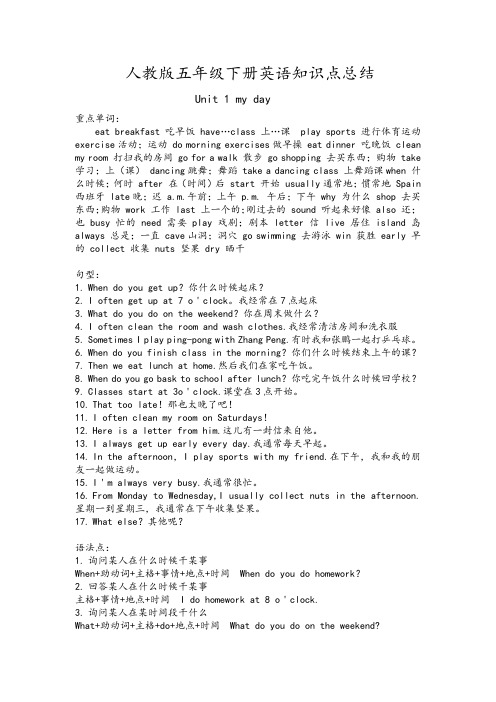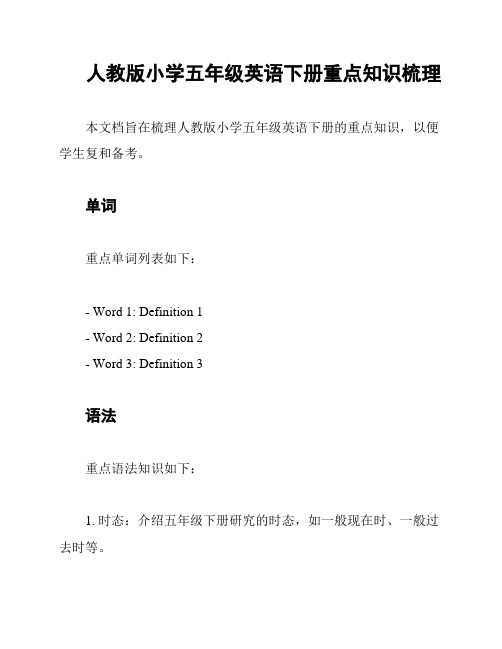人教版五年级英语下册知识点总结
人教版五年级下册英语第一单元知识点总结

人教版五年级下册英语知识点总结Unit 1 my day重点单词:eat breakfast吃早饭 have…class上…课 play sports进行体育运动exercise活动;运动 do morning exercises做早操 eat dinner 吃晚饭 clean my room 打扫我的房间 go for a walk 散步 go shopping 去买东西;购物 take 学习;上(课) dancing跳舞;舞蹈 take a dancing class 上舞蹈课when 什么时候;何时 after 在(时间)后 start 开始 usually通常地;惯常地 Spain 西班牙 late晚;迟 a.m.午前;上午 p.m. 午后;下午 why 为什么 shop 去买东西;购物 work 工作 last 上一个的;刚过去的 sound 听起来好像 also 还;也 busy 忙的 need 需要 play 戏剧;剧本 letter 信 live 居住 island 岛always 总是;一直 cave山洞;洞穴 go swimming 去游泳 win 获胜 early 早的 collect 收集 nuts 坚果 dry 晒干句型:1.When do you get up?你什么时候起床?2.I often get up at 7 o'clock。
我经常在7点起床3.What do you do on the weekend?你在周末做什么?4.I often clean the room and wash clothes.我经常清洁房间和洗衣服5.Sometimes I play ping-pong with Zhang Peng.有时我和张鹏一起打乒乓球。
6.When do you finish class in the morning?你们什么时候结束上午的课?7.Then we eat lunch at home.然后我们在家吃午饭。
人教版小学五年级英语下册重点知识梳理

人教版小学五年级英语下册重点知识梳理本文档旨在梳理人教版小学五年级英语下册的重点知识,以便学生复和备考。
单词重点单词列表如下:- Word 1: Definition 1- Word 2: Definition 2- Word 3: Definition 3语法重点语法知识如下:1. 时态:介绍五年级下册研究的时态,如一般现在时、一般过去时等。
2. 句型:总结五年级下册研究的常用句型,如祈使句、疑问句等。
3. 词类:梳理五年级下册研究的常见词类,如名词、动词、形容词等。
句子填空本部分包含若干个练题,要求学生根据给定的句子,填入适当的单词或词组。
1. Sentence 1: _________ ________ ________?2. Sentence 2: _________ ________ ________ ________.阅读理解本部分提供了几篇短文,要求学生阅读后回答相关问题。
1. Passage 1: Title of the passage- Question 1: _________ ________ ________?- Question 2: _________ ________ ________?2. Passage 2: Title of the passage- Question 1: _________ ________ ________?口语练本部分提供了几个口语练题,要求学生根据给定的情景进行对话。
1. Situation 1: _________- Sentence 1: _________ ________ ________?2. Situation 2: _________- Sentence 1: _________ ________ ________?以上是人教版小学五年级英语下册的重点知识梳理,希望对同学们的复有所帮助。
祝大家研究进步!(注意:本文档仅提供了梳理重点知识的框架,具体内容请参考教材。
小学英语人教版PEP五年级下册1-6单元知识点总结

Unit1 My day一、基本句型1.询问什么时候做某事:- When do you ……?你什么时候……?- I usually…at …. 我通常在…(点钟)…。
例:-When do you eat breakfast?-I eat breakfast at 7:00.2.What do you do on the weekend?你周末做什么?- I +频率副词+周末活动+时间。
或Sometimes I+周末活动例句:I sometimes go shopping with my mum on the weekend.(周末我时候和妈妈一起去购物)二、知识点:1.频率副词:always(总是,一直)>usually(通常)>often(经常)>sometimes(有时)2.只有Sometimes可以放在句首。
(Sometimes I cook dinner.)3.On the weekend 在周末on Saturdays 在周六on Sundays在周日(别忘加s)Unit2 My favourite season1.-Which season do you like best? (你最喜欢哪个季节?)Why?(为什么)-I like +季节+ best.(I like spring∕summer∕fall∕winter best) Because ___________.(因为)或:-What‘s your favourite season? -My favourite season is spring∕summer∕fall∕winter.2.-Why do you like winter best?(你为什么最喜欢冬天?) -Because______.二、知识点:1.leaf(树叶):复数leaves2.W,W真神奇,问出许多大问题。
what,what,问“什么”,when,when,问“时间”,where,where,问“哪里”,which,which,“哪一个”,why,why,“为什么”.Unit3 My school calendar补充:1.Dragon Boat Festival 龙舟节或端午节(农历五月五日)一般在阳历6月2.月份首字母大写。
人教版五年级下册英语知识点

人教版五年级下册英语知识点
一、语音
1.英语语音
–学习英语音标的正确发音方法;
–学习英语字母拼读方法;
2.语音练习
–学生通过朗读英文文章、对话等来练习语音及发音。
二、词汇
1.单词学习
–学生学习单词的发音、拼写及中文翻译;
–学生通过听说读写等方面来掌握单词的意义和用法。
2.词组学习
–学生学习常用的英语词组,如问候语、告别语、时态等。
3.句型学习
–学生学习常用的英语句型、语法、朗读练习等。
三、语法
1.时态
–学习英语时态的用法、规则及相应的动词变化形式。
2.名词
–学习英语中名词的单复数形式、可数和不可数名词等。
3.动词
–学习英语动词的时态变化、情态动词及不规则动词等。
4.形容词、副词
–学习英语形容词和副词的比较形式和程度修饰等。
5.代词、介词
–学习英语代词和介词的用法及功能。
6.连词
–学习英语连词的种类、用法及连接作用。
四、阅读
1.真题阅读
–学生通过阅读真题来掌握文章主旨、关键词、细节等内容。
2.阅读理解
–学生通过阅读并回答问题的形式来提高阅读能力。
五、口语
1.听力训练
–学生通过听力训练来提高英语语音的敏感度。
2.口语对话
–学生通过对话演练来提高口语交流能力。
六、写作
1.书写规范
–学生通过规范的书写来提高英语书写能力。
2.作文
–学生通过写作来提高英语语言表达能力和思维能力。
人教版五年级下册(英语Unit 2) 知识点总结

Unit2My favourite season一、重点单词1.春天spring2.夏天summer3.秋天autumn/fall4.冬天winter5.季节season6.去野餐go on a picnic7.摘苹果pick apples8.堆雪人make a snowman9.去游泳go swimming10.因为because11.做得好good job12.哪一个which13.暑假summer vacation/holiday14.落下;秋天fall15.可爱的;美丽的lovely16.孩子们(复数)children17.最;最高程度地best18.看……look at19.天气weather20.在雪中玩play in the snow21.种花plant flowers22.吃冰激凌eat ice cream23.叶子leaf(复数leaves)24.许多lots of/a lot of25.家庭family26.到处everywhere27.热的hot二、重点句子1.Do you like the music,children?孩子们,你们喜欢这首音乐吗?2.–Which season do you like best?你最喜欢那个季节?–I like spring best.There are beautiful flowers everywhere.我最喜欢春天。
(因为)到处都有美丽的花。
3.Spring is green with flowers and songs.Summer is hot and the days are long.Autumn is golden and farmers are busy.Winter is white and the year is gone.春天花红柳绿歌声扬。
夏天炎热白昼长。
秋天金色农民忙。
冬天白色年已终。
(歌谣句子可选用于写作)4.The weather is good and the colours are beautiful!天气很好,色彩很美丽!5.I like summer,but I can’t swim.我喜欢夏天,但是我不会游泳。
部编人教版小学 五年级英语下册第三单元 知识点总结

部编人教版小学五年级英语下册第三单元知识点总结部编人教版小学五年级英语下册第三单元知识点总结本文档总结了部编人教版小学五年级英语下册第三单元的各个知识点。
1. 单词1.1. 名词- apple 苹果- banana 香蕉- orange 橙子- strawberry 草莓- tomato 西红柿1.2. 动词- eat 吃- drink 喝- like 喜欢- love 爱- want 想要2. 句子2.1. 询问喜好- What do you like?- Do you like apples?2.2. 表达喜好- I like bananas.- He loves strawberries.2.3. 表达想要- I want an apple.- She wants to drink water.3. 语法3.1. 疑问句- What do you want?- Do you like tomatoes?4. 练题请根据所学词汇和句型,完成以下练。
1. 用英语表达“我喜欢吃草莓。
”2. 描述一下你喜欢的水果。
3. 用英语询问他想要吃什么。
4. 写出一个包含疑问句的句子。
5. 总结通过本单元的研究,我们学会了描述喜好和想要的事物,并研究了一些水果的英文名称。
同时,我们也研究了一些基本的疑问句的构造。
这些知识点为我们在日常生活中进行简单交流提供了基础。
以上是对部编人教版小学五年级英语下册第三单元知识点的总结。
---(The above document is a summary of the key points covered inUnit 3 of the 5th-grade English textbook by the People's Education Press. It provides a list of vocabulary words, sample sentences, grammar structures, and exercises related to expressions of preferences and desires, as well as the names of some fruits in English.)。
人教版小学五年级英语下册知识点归纳
人教版小学五年级英语下册知识点归纳五年级英语下册是小学阶段的最后一学期,学生们将进一步学习英语的语法、词汇和日常交际用语。
本文将对五年级英语下册的知识点进行归纳,以帮助学生更好地复习和掌握这些知识。
一、语法知识点1. 一般现在时:表示经常性的动作或习惯性的行为,结构为主语+动词原形。
例如:"She often goes to the park on weekends."2. 一般过去时:表示过去发生的动作或状态,结构为主语+动词过去式。
例如:"Yesterday, I played soccer with my friends."3. 现在进行时:表示现阶段正在进行的动作,结构为主语+be动词(am/is/are)+动词-ing形式。
例如:"They are watching a movie in the cinema."4. 一般将来时:表示将来要发生的动作或事件,结构为主语+will+动词原形。
例如:"I will visit my grandparents next week."5. 动词的-ing形式:表示正在进行的动作,或者作为主语、定语、表语、宾语补足语等。
例如:"I enjoy swimming in the summer."6. 动词的过去式:表示过去发生的动作或状态。
例如:"He ate an apple for breakfast."二、词汇知识点1. 数字:学习1-100的基本数字,以及基本的数学运算符号。
例如:"5 + 3 = 8."2. 季节和月份:学习四季和每个月份的英文表达,以及与之相关的天气和活动。
例如:"In winter, it often snows. We can go skiing."3. 食物:学习常见食物的英文表达,以及与之相关的问答句型。
(完整版)人教版PEP五年级下册英语知识点复习总结
五年级英语下册知识点复习总结
Unit1Myday
1.询问对方何时做某事的句型
Whendoyou+动词(短语)原形+其他? (表示事件)
I(+频度副词)+动词(短语)原形+at+时间点。 注意:询问第三人称单数人称何时做某事的时候应将 do 改为 does,其 答语的主语为第三人称单数,动词部分应变为第三人称单数形式。(以下情况
同样需注意此项)
如:WhendoeshegetupHegetsupat6:00a.m. 译:他什么时候起床?他在上午六点起床。
2.询问对方周末做什么的句型
WhatdoyoudoontheweekendSaturdays. I(+频度副词)+动词(短语)原形+withsb(人)+onSundays. theweekend.
(2)在基数词后加 th:除去 first,second,third,其他基数词变序数词一般 直接在其后加 th。注意 five 与 twelve 要先把 ve 变 f,再加 th;eight 直接加 h;nine 去 e 再加 th。
(3)整十序数词以 ieth 结尾:整十位的序数词先将十位整数词尾的 y 变为 i, 再加 eth。如:twenty-twentieth。
The
注意:play-plays 因为 a 是元音 3)以 ch,sh,s,x 或 o 结尾的动词,在后面加-es; 例如 teach-teacheswash-washesdo-doesgo-goesfix-fixes
4)不规则的; 例如 have-has
5.by 的用法
五年级下册英语知识点整理(人教)
五年级下册英语第一单元知识点整理 1、主要单词和短语: do morning exercises 晨练,做早操 eat breakfast 吃早饭 have English class 上英语课 eat dinner 吃晚饭 play sports 进行体育活动 eat lunch 吃午饭 climb mountains 爬山 go shopping 购物,买东西 play the piano 弹钢琴 visit grandparents 看望(外)祖父母 go hiking 去远足
二、主要句子: When do you eat dinner? 你什么时候吃晚饭? I eat dinner at 7:00 in the evening. 我晚上七点吃晚饭。 When do you get up? 你什么时候起床? I usually get up at 12:00 at noon. 我通常在中午12点起床。 What do you do on the weekend? 你在周末干什么? Usually I watch TV and go shopping. 我通常看电视和购物。 I often play football. 我经常踢足球。 Sometimes I go hiking. 有时候我去远足。
三、重要知识点 同义词: eat breakfast-have breakfast , eat lunch-have lunch, eat dinner-have dinner play sports-do sports, usually-often 复数形式:policeman-policemen policewoman-policewomen 现在分词:tell-telling 第三人称单数:say-says 同义句:What do you do ? ---What are you? 你是干什么的? 表示频度的副词:always 总是,一直;usually 通常,常常;often 经常; sometimes 有时候 以复数形式出现的词组:visit grandparents ,plant trees 介词后跟表示时间的词语时,表示在某年、某月、某个季节,某个时候(在上午,在下午,在晚上)用in;表示在某一天,在星期几用on,在具体的几点几分用at. too 和either的用法区别:too和either都是“也”的意思,但too用于肯定句,either用于否定句。 五年级下册英语第二单元知识点整理 一、主要单词和短语: season 季节 spring 春天 summer 夏天 fall 秋天 winter 冬天 swim 游泳 fly kites 放风筝 skate 滑冰 make a snowman 堆雪人 plant trees 种树
(完整版)人教版小学PEP英语五年级下册知识点归纳
人教版小学PEP英语五年级下册知识点归纳PEP五年级英语下册各单元知识点Unit 1 My day一、重点词汇。
1.四会词汇:eat breakfast 吃早饭 have···class 上······课play sports 进行体育运动exercise 活动;运动 domorning exercises做早操eat dinner吃晚饭clean my room 打扫我的房间go shopping 去买东西;购物go for a walk 散步take学习;上(课) dancing跳舞;舞蹈 take a dancing class 上舞蹈课2. 三会词汇:when什么时候after 在(时间)后start 开始usually 通常地;惯常地Spain 西班牙late 晚;迟 a.m. 午前;上午 p.m. 午后;下午why 为什么shop 去买东西;购物work 工作last 上一个的;刚过去的sound 听起来好像also 还;也busy 忙的 need 需要play 戏剧;剧本letter 信live 居住island 岛always 总是;一直cave 山洞;洞穴go swimming 去游泳 win 获胜二、其他日常活动。
get up起床 eat lunch吃午饭 go to bed 上床睡觉wash my face洗脸 wash my clothes 洗我的衣服 watch TV看电视play ping-pong打乒乓球 playthe pipa弹琵琶 go swimming去游泳go running去跑步 do homework 做作业 do kung fu练武术play football踢足球 play basketball打篮球三、频度副词。
always总是,一直(100%) usually通常(80%)often 经常(60%) sometimes(30%)有时四、疑问词。
- 1、下载文档前请自行甄别文档内容的完整性,平台不提供额外的编辑、内容补充、找答案等附加服务。
- 2、"仅部分预览"的文档,不可在线预览部分如存在完整性等问题,可反馈申请退款(可完整预览的文档不适用该条件!)。
- 3、如文档侵犯您的权益,请联系客服反馈,我们会尽快为您处理(人工客服工作时间:9:00-18:30)。
人教版五年级英语下册知识点总结 对话一: A: When do you get up ? 你什么时候起床啊? B: I usually get up at 6:30.When do you eat breakfast? A: At 6:20. What about you? / And you? 你呢? B: I usually eat breakfast at 7:00. 对话二: A: Excuse me .Can I ask you some questions ? 打扰了,我能问你几个问题吗? B: Sure. A: What do you do ? 你是做什么的? B: I am a policeman . A: When do you go to work ? 你什么时候去上班? B: I usually go to work at 9:00 in the evening. A: When do you go home ? B: I go home at 5:00 in the morning . A: Thank you for telling me about your day.谢谢你告诉我你的一天。 B: You’ 对话三: A: What do you do on the weekend ? 你周末干什么呀? B: Usually I watch TV and go shopping. Sometimes I visit my grandparents.What about you ? 我通常看电视和购物。有时候去拜访我的祖父母。你呢? A: I often play football . Sometimes I go hiking . B: That’s fun .好玩
句型: 1、询问某人的生活,学习规律 ——when do you +动词(短语) ——I(usually)+动词(短语)+at + 时间. 2、Excuse me . 用在打扰别人时的一种客气说法,意为:打扰了。 3、询问某人的职业 ——What do you do ? ——I am … 4、Thank you for telling me about your day.谢谢你告诉我你的一天。 Thank you for doing sth. 谢谢你为我做了什么事情…… 5、询问某人的生活,学习等习惯 ——What do you do on the weekend? 周末你做什么? ——I (频率词)… 我… …
短语: 1、do morning exercises(晨练) eat breakfast(吃早饭) have English class(上英语课) play sports(进行体育运动) eat dinner(吃晚饭) get up起床 go to work去上班 go home回家 2、in the evening在晚上 in the morning在早上 3、climb mountains(爬山) go shopping(购物;买东西) play the piano (弹钢琴) visit grandparents(看望祖父母) go hiking(去远足) watch TV看电视 play football踢足球 clean my room打扫房间 注:表示频度的副词(频率由高到低排列):always 总是,一直 usually 通常 often 经常 sometimes 有时 never 从不 Unit 2 My Favourite Season 对话一: A: Which season do you like best ? 你最喜欢那个季节? B: Fall. It's always sunny and cool. Which season do you like best ? A: Winter. I can play with snow. 我可以玩雪。 B: I don't like winter. It's too cold. 对话二: A : What 's your favourite season , Tom ? Tom,你喜欢的季节是什么? B : Spring. A : Why do you like spring ? 你为什么喜欢春季? B : Because I can plant trees. Which season do you like best ? A : Winter. B : Why do you like winter ? A : Because I can skate. 因为我可以滑冰。 对话三: A : When is the best time to go to Beijing? 什么时间去北京最好啊? B : Fall. 秋天 A : What is the weather like in fall in Beijing ? 秋天北京的天气怎么样啊? B : It's sunny and cool. 天气既晴朗又凉爽。 A : What can I do there ? 我在那里可以做什么啊? B : You can go to the Great Wall.
句型: 1、——Which season do you like best? 你最喜欢哪一个季节? ——I like winter best. /Winter. 或者——What’s your favouite season? 你最喜欢的季节是什么? ——Spring / Summer/ Fall/ Winter is (my favourite season ). 春/夏/秋/冬天 注意:Which season do you like best ? 这句话中的season 可以换成fruit(水果)、animal(动物)、color(颜色)等等。 2、——Why do you like+季节 ? 你为什么喜欢冬天? ——Because I can +短语 因为我能...... 3、What is the weather like in fall in Beijing ?天气怎么样? in fall in BeiJing 在北京的秋天。在英语中先说时间再说地点 4、the best time to do sth. 做…的最佳时间。
单词: 1、 Seasons季节 Spring (windyand warm) 春天 summer ( sunny and hot) 夏天 fall ( windy and cool) 秋天 winter (windy and cold) 冬天 在那个季节用 in 如:in spring / summer / fall / winter 在春天/夏天/秋天/冬天 2、play with sb./sth和某人、某事物玩play with snow玩雪 3、swim游泳 fly kites放风筝 skate滑冰 make a snowman堆雪人 plant trees种树 sleep a long time睡很长时间 Unit 3 MY BIRTHDAY 对话一: A : When is your birthday ? 你生日是什么时候啊? B : My birthday is in February . Is your birthday in February ,too ?你生日也在二月吗?
A : No, my birthday is in December. What about you, Zhang Ping? C: My birthday is in October . 对话二: A : How many birthdays are there in February ? 二月份有几个生日啊 ? B:There are four birthdays in February . 对话三: A : Who has a birthday in October ? 谁的生日在十月? B : Me . A : What's the date ? 是哪天呀?(询问具体时间) B : It's October 1st . Is your birthday in March? A: Yes,it is. B: What's the date? A : March 12th . 我的生日是三月十二日。
句型: 1、——When is your birthday ? ——My birthday is in+月份 (必须用in) 2、My birthday is in February. 变为一般疑问句——Is your birthday in February? ——Yes, it is. /No, it isn't . 3、What about you, Zhang Ping? 你呢? 4、——How many birthdays are there in February ? ——There are four birthdays in February . There be 句型 ,表示有、在。(There is﹢单数名词/不可数名词;There are﹢复数名词) 5、Who has a birthday in +月份? 询问谁的生日在哪个月份。 6、——What's the date (today)? 是哪天呀?(询问具体时间) ——It's﹢具体日期 (月份+序数词简写). 读序数词时,前面一定要加the. 如 October 1st .读作October the first.但是写的时候不加the。 What day is it today? 今天星期几?
单词: 1、January(Jan.) 一月 February (Feb.) 二月 March(Mar.)三月 April ( Apr.)四月May五月 June六月 July七月 August (Aug. )八月 September(Sept.)九月 October (Oct.)十月 November(Nov.)十一月 December (Dec.)十二月 关于月份:(1)五~七月没有简写形式。九月September 的简写形式是前四个字母加点Sept. 其他八个月的简写形式是前三个字母加点。(2)无论是完全形式还是简写形式,表示12个月的单词的第一个字母都要大写。 2、节日的名词(名词所有格1、名词后加’s ,如John’s , your father’s 2、以s 结尾的名词加’,如 the
